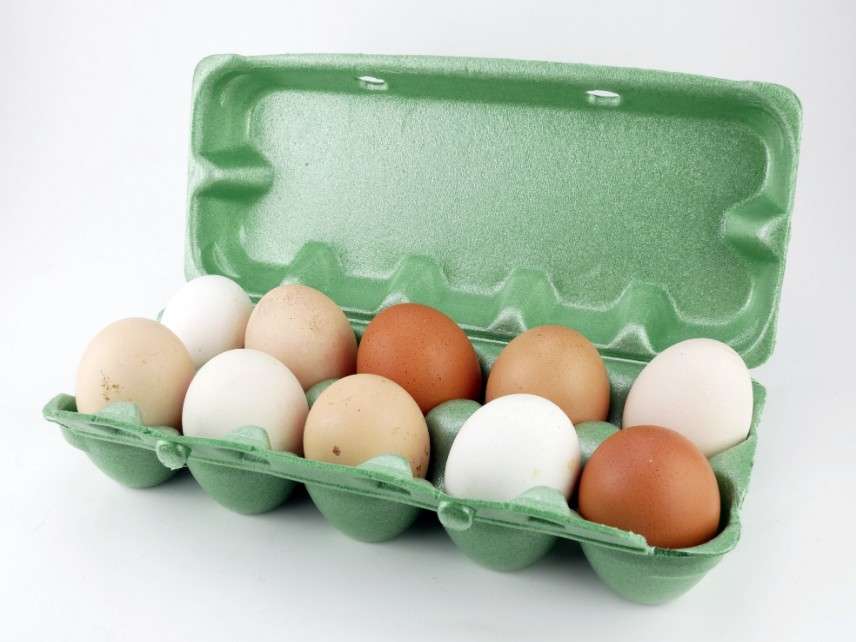The Midterms Were a Mixed Bag for Food Freedom
We gained some food freedom, we lost some food freedom.

This week's midterm elections, in case you missed the news, were the most important election of your lifetime. While the president, control of the House of Representatives, and Bigfoot erotica dominated national headlines during this ostensibly crucial election season, food-policy issues—my focus—were at the heart of several ballot measures and other contests around the country.
The most impactful food-policy ballot measures were decided up and down the West Coast.
In California, voters adopted Proposition 12, which will require egg producers within and without the state to go cage-free by 2022 and also impact pork and veal producers. The law is similar to a 2016 Massachusetts law that was, in turn, inspired by an earlier California law. (Litigation over these laws is ongoing.)
Several groups opposed Prop. 12, including PETA, which argued the measure did not go far enough. Various egg and pork producers opposed it by arguing in part, rightly, that the radical measure would raise food prices.
Despite its passage, Prop. 12 likely faces an uncertain future. The ongoing litigation over the Massachusetts and California livestock laws and over California's wrongheaded and unconstitutional foie gras ban—cases the U.S. Supreme Court should and may soon take up—could overturn portions of the law. The new California law is likely to put pressure on Congress to include provisions in the upcoming Farm Bill that would preempt these California and Massachusetts laws, among others.
That Farm Bill has been in the works for months now. With a divided Congress set to arrive in January, many farmers hope the current GOP Congress will pass the Farm Bill now, before Democrats take control of the House.
Though the bill will undoubtedly suck once passed—whichever party controls the House—its earlier passage might contain at least two positive provisions. There's the aforementioned preemption measure. And there's legalization of hemp farming, which appears to have a good chance to appear in any final Farm Bill. One of the chief advocates in Congress for legalizing hemp, James Comer (R-Ky.), won reelection. Vile scumbag Steve King (R-Iowa), who sponsored the farm bill, also survived a close House race this week.
Further up the coast from California, ballot measures that would restrict local governments from enacting food taxes in Oregon and Washington State, respectively, yielded decidedly different results. Voters in Oregon rejected Measure 103, which would have preempted local governments from enacting new food and beverage taxes, with a few exceptions (e.g., alcohol).
Also on Tuesday, Washington State voters—me included—chose to adopt a ban, Initiative 1634, similar to the one Oregon voters rejected. The ban is too little, too late for residents of Seattle, where I live, which last year adopted a soda tax that's grandfathered in under the new law. Though Washington State now joins California in adopting statewide preemption of local grocery and soda taxes, it's worth noting that efforts are already underway to place a measure on the 2020 California ballot that could tax soda statewide.
Food policy also played a key role in several other election-day contests around the country.
Alaska voters rejected a measure that would have strengthened salmon conservation, which opponents argued would kill jobs. Voters in farm country sent mixed signals to Members of Congress who supported the president's tariffs, which, as predicted, have had an outsized impact on farmers. Several were ousted, but others won reelection. And, in perhaps the quaintest of election-day food-policy news, voters in Perry County, Ky., a state still home to dry counties, split evenly (155-155) over a measure that would allow the sale of alcohol in Buckhorn Lake State Park. The vote came down to a coin toss. Alcohol sales—heads—prevailed.
So how does all this food-policy election news shake out? Did Americans gain or lose food freedom on Tuesday? This week's food-policy electoral results—like those from other contests and ballot measures—appear to be a mixed bag. But, given how important we're told this election was, I guess it's the most important mixed bag of your lifetime.


Show Comments (20)